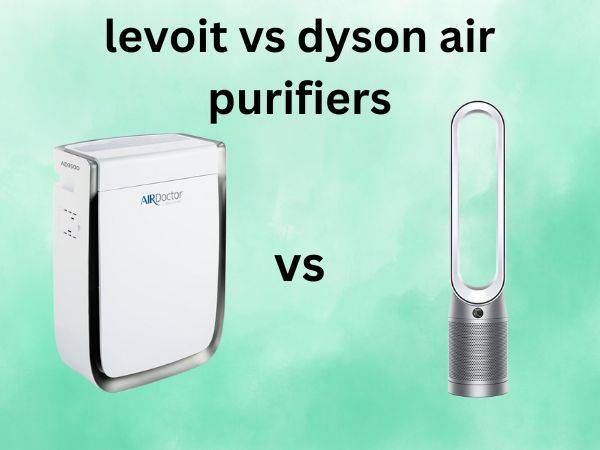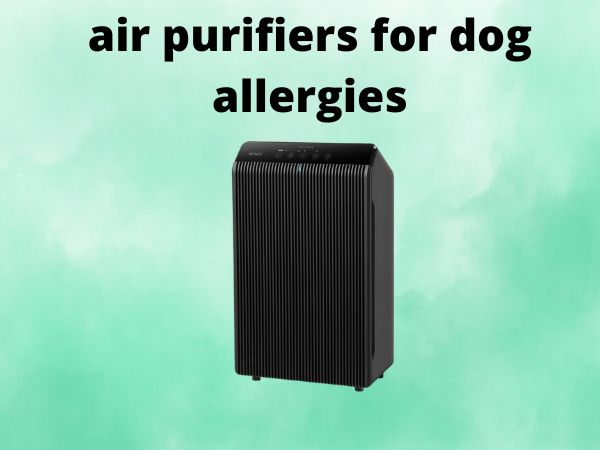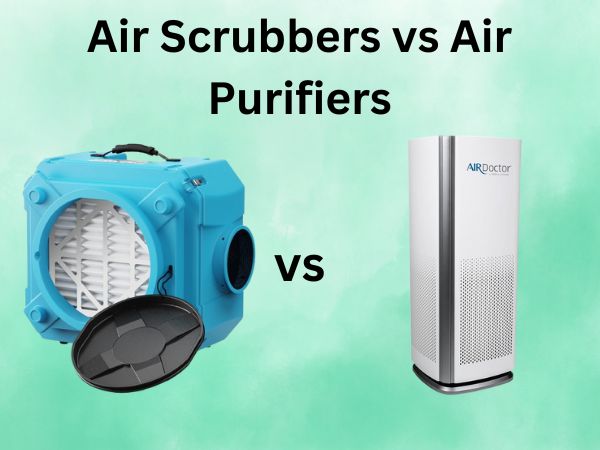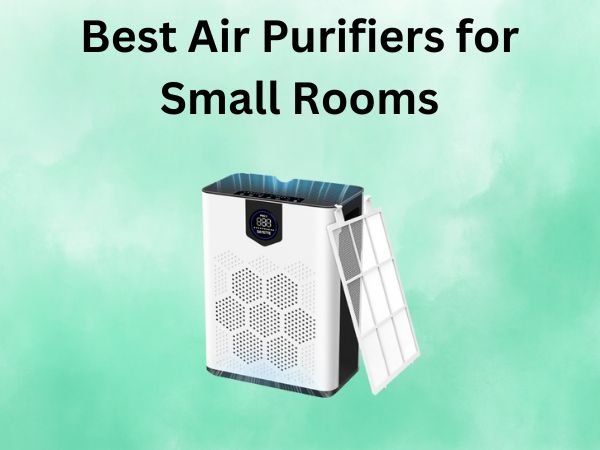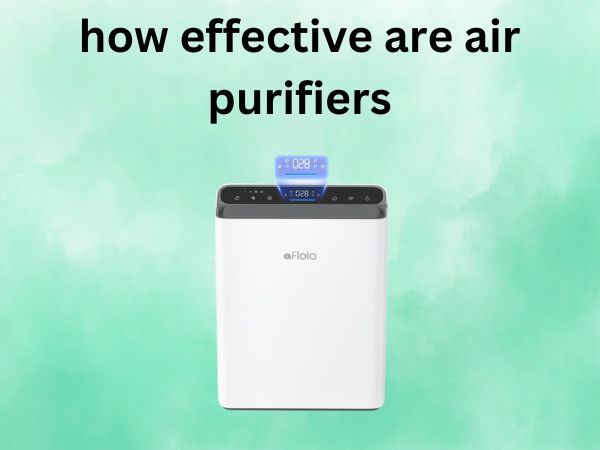Levoit vs Dyson Air Purifiers [A Comprehensive Comparison]
Are you struggling to choose between a Levoit and a Dyson air purifier? I’ve been there. With air quality becoming increasingly important in our homes, selecting the right air purifier can feel overwhelming. Both Levoit and Dyson offer impressive options, but they differ significantly in technology, design, and price points.
In this article, I’ll break down everything you need to know about these two popular brands, helping you determine which one aligns better with your specific needs. From filtration technology to smart features, design considerations to long-term costs—we’ll cover it all.
Table of Contents
Understanding Air Purifier Technology
Before diving into the brand comparison, let’s get familiar with the technology that powers these devices.
How Air Purifiers Work
Air purifiers work by drawing in air from your room, passing it through a series of filters that trap contaminants, and then releasing the cleaned air back into your space. The effectiveness of an air purifier largely depends on its filtration system, airflow rate, and the specific technologies employed.
Most modern air purifiers use a combination of these filtration methods:
- HEPA (High-Efficiency Particulate Air) filters – Capture at least 99.97% of particles as small as 0.3 microns
- Activated carbon filters – Absorb odors, gases, and volatile organic compounds (VOCs)
- Pre-filters – Trap larger particles like dust and hair
- UV-C light – Kills bacteria and viruses (in some models)
- Ionizers – Release negatively charged ions to attract positively charged particles (though this technology is controversial due to potential ozone production)
Key Features to Consider When Buying
When shopping for an air purifier, pay attention to:
- CADR (Clean Air Delivery Rate): This measures how quickly the unit can filter air in a given space
- Room size coverage: Measured in square feet
- Filtration stages: More stages typically mean more thorough purification
- Noise levels: Measured in decibels (dB)
- Energy efficiency: Look for ENERGY STAR certification
- Smart features: App control, air quality monitoring, voice assistant compatibility
- Design: Size, appearance, and how it fits into your space
- Maintenance requirements: Filter replacement frequency and costs
Now, let’s see how Levoit and Dyson stack up across these important factors.
Levoit Air Purifiers: Brand Overview
Levoit has quickly become a household name in the air purifier market, known for offering high-quality units at more accessible price points.
Levoit’s Technology and Filtration Systems
Levoit primarily uses a 3-stage filtration system in most of their models:
- Pre-filter: Captures larger particles like dust, lint, fur, and hair
- True HEPA filter: Removes at least 99.97% of airborne particles as small as 0.3 microns
- Activated carbon filter: Neutralizes smoke, odors, and volatile organic compounds
What separates Levoit from many competitors is their commitment to ozone-free purification. Unlike some brands, Levoit doesn’t use ionizers or UV-C light that might produce trace amounts of ozone.
Popular Levoit Models
Levoit Core 300
The Core 300 is Levoit’s bestselling compact model, perfect for bedrooms and small to medium-sized spaces. It features:
- Coverage for rooms up to 219 sq ft
- 360° air intake for efficient purification
- Whisper-quiet operation (24dB on sleep mode)
- Simple touch controls
- Timer settings and display off option
- Affordable replacement filters
What impresses me most about the Core 300 is how it packs impressive performance into a compact, budget-friendly package. Many users report noticeable improvements in air quality and allergy symptoms within days of use.
Levoit LV-H133
For larger spaces, the LV-H133 tower purifier offers:
- Coverage for rooms up to 538 sq ft
- Higher CADR ratings than the Core 300
- Real-time air quality indicator
- Smart auto mode that adjusts fan speed based on detected air quality
- Timer function and sleep mode
- Sleek tower design that saves floor space
The LV-H133 represents Levoit’s move toward more advanced features while maintaining their reputation for value.
Dyson Air Purifiers: Brand Overview
Dyson entered the air purifier market with their signature approach: revolutionary design combined with cutting-edge technology—and premium pricing to match.
Dyson’s Proprietary Technology
Dyson air purifiers stand out with their bladeless fan design and proprietary Air Multiplier™ technology. Here’s what makes them different:
- Sealed HEPA + Activated Carbon system: Dyson claims their sealed system ensures that what gets captured stays captured
- Air Multiplier™ technology: Projects purified air throughout the room without visible blades
- 360° glass HEPA filter: Captures particles as small as 0.1 microns (smaller than the industry standard)
- Built-in sensors: Monitor air quality in real-time and display results on-device and in the Dyson Link app
Many Dyson models also function as fans, heaters, or humidifiers, offering true multi-functionality beyond air purification.
Popular Dyson Models
Dyson Pure Cool
The Pure Cool combines air purification with cooling fan functionality:
- Projects purified air up to 350° throughout the room
- Oscillation feature for wider air distribution
- Backward airflow mode for winter (purifies without cooling)
- LCD screen showing real-time air quality data
- Voice control compatibility with Alexa, Siri, and Google Assistant
- Sleep timer and night mode with quieter operation
The Pure Cool exemplifies Dyson’s approach to multi-functionality, working year-round as both purifier and fan.
Dyson Pure Hot+Cool
Taking versatility even further, the Pure Hot+Cool adds heating capabilities:
- Thermostat control for precise temperature regulation
- Automatic shut-off if tipped over
- Focused mode for personal heating/cooling or diffused mode for room-wide effect
- Air projection up to 350°
- All the purification features of the Pure Cool
With the ability to heat, cool, and purify, this model aims to be the only air treatment device you’ll need year-round.
Head-to-Head Comparison: Levoit vs Dyson
Now let’s compare these brands directly across several key factors.
Performance and Efficiency
When it comes to pure air cleaning performance:
- Filtration effectiveness: Both brands use True HEPA filters, though Dyson claims to capture smaller particles (0.1 microns vs. 0.3 microns)
- CADR ratings: Levoit often provides clear CADR numbers, while Dyson uses their own metrics, making direct comparisons challenging
- Room coverage: Comparable models from both brands handle similar room sizes, though Dyson tends to project air further
In my research, independent tests suggest that both brands effectively clean air to a similar degree when properly sized for the space. The differences become more apparent in specific use cases rather than overall cleaning ability.
Design and Aesthetics
This is where the brands diverge significantly:
- Levoit prioritizes practical, understated designs that blend into home decor. Their units are typically cylindrical or tower-shaped with clean lines and neutral colors.
- Dyson treats air purifiers as statement pieces with their distinctive bladeless loop designs, premium materials, and futuristic appearance.
Your preference here may depend on whether you want your air purifier to blend in or stand out as a conversation piece.
Noise Levels
- Levoit units typically operate between 24-50 dB depending on the fan speed, with sleep modes that are genuinely quiet
- Dyson purifiers range from 40-63 dB, generally running louder at comparable settings
If you’re sensitive to noise, especially when sleeping, Levoit typically offers the quieter experience on lower settings.
Smart Features and Connectivity
Both brands have embraced smart technology, but with different approaches:
- Levoit offers smart features primarily in their higher-end models, including app control, voice assistant integration, and scheduling
- Dyson incorporates advanced smart features across their line, with detailed air quality reporting, extensive app functionality, and more granular control options
Dyson’s app experience and smart integration are generally more sophisticated, allowing for more detailed air quality monitoring and control.
Filter Replacement and Maintenance
Long-term ownership costs are significantly affected by maintenance requirements:
- Levoit filters typically need replacement every 6-8 months and cost $20-$50 depending on the model
- Dyson filters last approximately 12 months but cost $70-$80 to replace
While Dyson filters last longer, the higher replacement cost means annual maintenance expenses remain similar or higher than Levoit.
Cost Analysis: Initial Investment and Long-term Expenses
Let’s break down what you can expect to spend on these air purifiers.
Purchase Price Comparison
- Levoit air purifiers typically range from $90-$300, with most popular models around $100-$150
- Dyson air purifiers start around $400 and can exceed $700 for models with heating/cooling functions
The initial price difference is substantial—you could purchase 3-4 Levoit units for the cost of one Dyson purifier.
Operational Costs and Energy Efficiency
Both brands are relatively energy-efficient:
- Levoit models typically consume 30-45 watts on high settings, less on lower speeds
- Dyson purifiers use 40-60 watts on average, with additional energy consumption when heating functions are used
For continuous operation, expect to add $20-$50 to your annual electricity bill for either brand, with Dyson likely on the higher end of that range.
Filter Replacement Costs
As mentioned earlier:
- Levoit: $40-$100 annually for filter replacements (typically 2 changes per year)
- Dyson: $70-$80 annually for filter replacements (typically 1 change per year)
Over a five-year period, the total cost of ownership (purchase price plus maintenance) for a Levoit might be $300-$600, while a Dyson could cost $750-$1,100.
Consumer Reviews and Satisfaction
What do actual users say about these brands?
What Users Love About Levoit
- Excellent value for money
- Noticeable improvement in air quality
- Truly quiet operation, especially on sleep mode
- Simple, intuitive controls
- Affordable filter replacements
Common criticisms include limited smart features in base models and less impressive build quality compared to premium brands.
What Users Love About Dyson
- Exceptional build quality and design
- Multi-functionality (purifying, cooling, heating)
- Advanced air quality monitoring
- Smart home integration
- Powerful airflow and room coverage
The most common complaints center around the high price point and louder operation on higher settings.
Which Brand Is Right for You?
Based on all these factors, here’s my guidance on which brand might better suit different situations.
Ideal Scenarios for Choosing Levoit
Consider Levoit if:
- You’re on a budget but don’t want to compromise on air quality
- You prioritize quiet operation, especially for bedrooms
- You need multiple units for different rooms
- You prefer simple, straightforward operation
- You’re primarily focused on air purification rather than additional functions
Levoit offers exceptional value and focuses on doing one thing—purifying air—very well.
Ideal Scenarios for Choosing Dyson
Dyson might be better if:
- You want a multi-functional device (purifier + fan/heater)
- Design and aesthetics are important to you
- You’re interested in detailed air quality data and smart home integration
- You have a larger budget and prioritize premium build quality
- You want a conversation piece that also happens to clean your air
Dyson excels at combining multiple functions into stylish, technologically advanced packages.
Frequently Asked Questions
1. Are Levoit air purifiers as effective as Dyson at removing allergens?
Yes, both Levoit and Dyson air purifiers use True HEPA filters that remove at least 99.97% of airborne allergens as small as 0.3 microns. While Dyson claims to capture particles as small as 0.1 microns, both are highly effective at removing common allergens like pollen, dust mites, and pet dander. The key factor is choosing a model appropriately sized for your space.
2. How do Levoit and Dyson compare in terms of warranty coverage?
Levoit typically offers a 2-year warranty on their air purifiers, with the option to extend it by an additional year through registration. Dyson provides a 2-year warranty on parts and labor for most models. Both companies have responsive customer service, though Dyson’s premium pricing often comes with more personalized support options.
3. Can Levoit air purifiers remove smoke and odors as well as Dyson models?
Both brands use activated carbon filters to target smoke, odors, and VOCs. The effectiveness depends more on the amount and quality of activated carbon used rather than the brand name. Dyson’s larger models may contain more activated carbon, but Levoit’s dedicated smoke filters (available in models like the Core 300S) perform comparably in removing typical household odors and light smoke.
4. Do I need to replace Dyson filters less often than Levoit filters?
Yes, Dyson filters typically need replacement once per year, while Levoit recommends changing filters every 6-8 months. However, actual replacement timing depends on your air quality and usage patterns. Heavily polluted environments may require more frequent changes for both brands. It’s worth noting that while Dyson filters last longer, they cost significantly more than Levoit replacement filters.
5. Which brand is better for large open-concept spaces?
For large open spaces, Dyson often has an advantage due to its Air Multiplier technology that projects purified air further across the room. Models like the Dyson Pure Cool Tower can distribute clean air throughout large spaces more effectively. However, Levoit offers models like the LV-H134 that are designed for spaces up to 710 sq ft, and placing two mid-sized Levoit units at opposite ends of a large room can provide excellent coverage at a price comparable to a single Dyson unit.
Conclusion
Both Levoit and Dyson make excellent air purifiers that effectively clean indoor air, but they target different segments of the market.
Levoit offers practical, efficient air purification at accessible price points, making them ideal for cost-conscious consumers who want clean air without breaking the bank. Their straightforward approach and quiet operation have earned them a loyal following.
Dyson, meanwhile, delivers premium, multi-functional devices with cutting-edge design and technology for those willing to pay for innovation and style. Their air purifiers are as much about the experience and aesthetics as they are about cleaning the air.
Your choice ultimately depends on your priorities, budget, and specific needs. Whether you choose the practical value of Levoit or the premium experience of Dyson, investing in either brand’s air purifier will likely lead to cleaner air and a healthier home environment.

